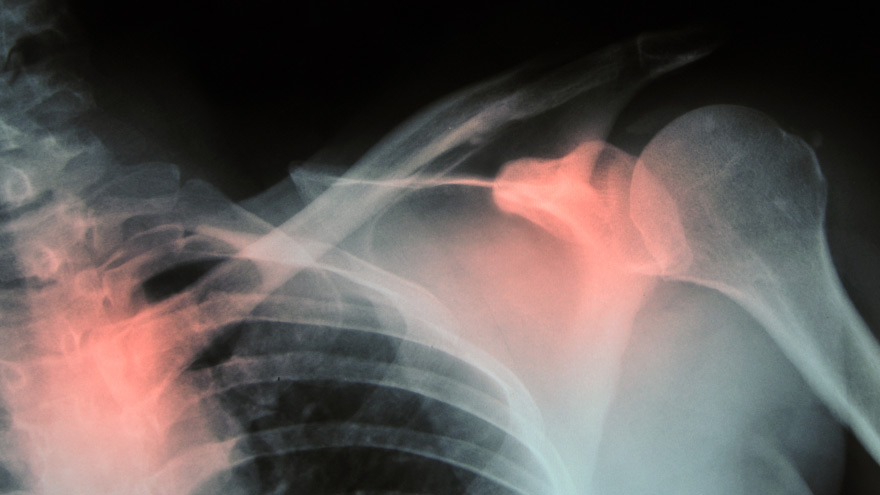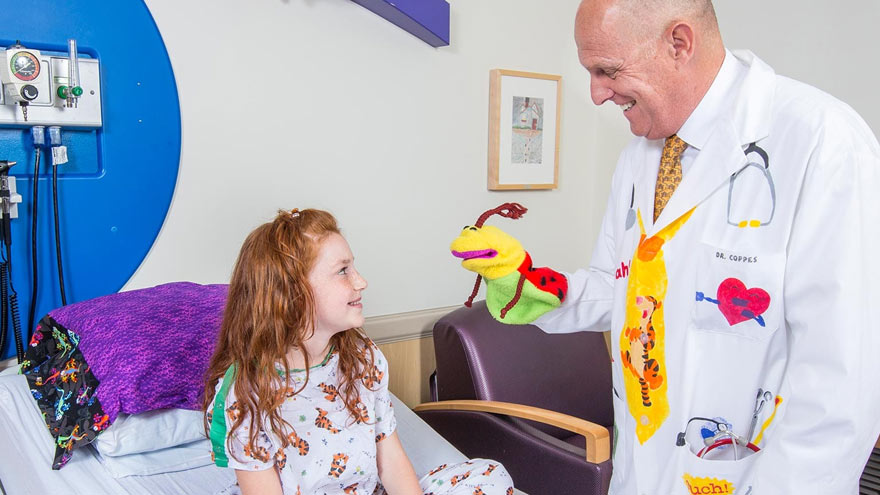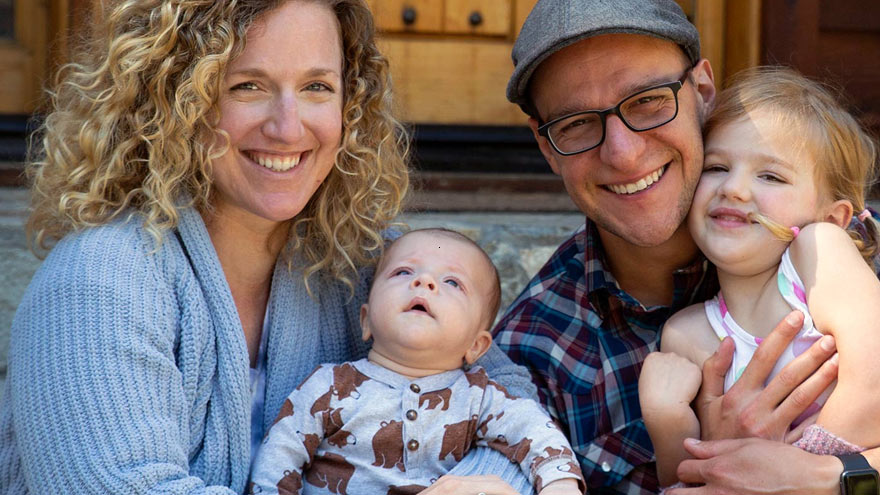Search
-
Prevent Osteoporosis: Take Control of Your Bone Health Today
Some risk factors associated with osteoporosis are out of your control. But you’re in luck, because some can be lessened by following simple tips. Below, Orthopedic Nursing Manager Katie McCarthy discusses the signs, symptoms and preventive measures. By Katie McCarthy, BSN, RN, ONC, Orthopedic Nursing Manager, Renown Health Osteoporosis is often called the silent disease, because it develops gradually for years with no clear signs or symptoms. And while some bone loss is expected as we age, osteoporosis is not a normal part of aging. So it’s important to start thinking about your bone health early. Bone is not just a lifeless scaffold for the body. It is living tissue that regenerates continually. Once we reach peak bone mass around age 25, we begin losing more bone than we produce, increasing the risk of developing osteoporosis — which literally means porous bone and points to a loss in bone density. In severe cases, normal everyday activities or movements, like hugging, can cause a fracture. After the first fracture you’re at higher risk for more, which can lead to a life of chronic pain and immobility. Bone fractures in the spine or hip are the most serious. Hip fractures can result in disability and even death — especially in older adults. Spinal fractures can even occur without falling. The vertebrae weaken to the point that they simply crumple, which can result in back pain, lost height and a hunched-forward posture. Osteoporosis: Uncontrollable Risk Factors Women are at greater risk of developing osteoporosis than men, and white and Asian women are at higher risk than black and Hispanic women. Other uncontrollable risk factors include: age; a family history of osteoporosis; certain genetic conditions; medications and medical treatments; eating disorders; a low body weight and small, thin frame; ethnicity; menopause: In fact, the lack of estrogen produced during menopause is largely responsible for a woman’s increased risk. Poor diet, tobacco use, excessive alcohol consumption, lack of exercise and an unhealthy weight also contribute to bone loss. Fortunately, those risk factors are in your control. Without symptoms, you can’t know if you’ve developed osteoporosis unless you get a bone density test or suffer a fracture. If you fall into a high-risk group, are over age 50 or have any concerns about your bone health, consult your doctor and find out if you need to be evaluated. Additionally, if either of your parents sustained hip fractures, you experienced early menopause or took corticosteroids for several months — a steroid often prescribed to relieve inflammation and arthritis — you’ll want to talk to your doctor about your bone health. If you test positive, your doctor will devise a treatment plan to match your needs, which will include lifestyle changes surrounding diet and exercise to build and strengthen weak bones. Medication to slow bone breakdown and build new bone may be prescribed, depending on the severity of your bone loss. If you’ve sustained a spinal fracture that is causing severe pain, deformity or is not responding to non-surgical treatment, your doctor may recommend surgery. Reduce Your Risk of Osteoporosis You can strengthen your bones now to prevent osteoporosis from starting. Here are some tips: Eat a diet rich in fruits and vegetables and low in caffeine, sodium and protein. Avoid soda, and talk to your doctor to make sure you’re getting enough calcium and vitamin D. Don’t smoke — it directly correlates with a decrease in bone mass. Smokers also take longer to heal from a fracture. Limit alcohol to two to three beverages per day. It interferes with the production of vitamins needed to absorb calcium and the hormones that help protect bones. Exercise three to four times each week — it’s key to healthy bones. Weight-bearing exercises like jogging, hiking and especially weight lifting build bone mass and density. There are aspects of the aging process we can’t control, but we can do something about bone loss and osteoporosis. Find out your risk, and show your bones a little TLC — you’re going to need them. This story was also published in the Reno Gazette-Journal’s Health Source on April 24, 2016.
Read More About Prevent Osteoporosis: Take Control of Your Bone Health Today
-
A True Joint Effort: Exercises to Prevent Knee Pain
Experiencing knee pain during exercise or while undertaking daily activities? The knee is the largest joint in our body, so it goes without saying a lot hinges on its functionality. Here are a few exercises to help. Is exercise a real pain in the knee for you? Does getting up in the morning require a few minutes for your knees to adjust to walking around? As it turns out, knee pain is common, and it can result from injury, overuse or the breakdown of cartilage over time. Often, this pain is a result of faulty mechanics in your body, according to Jessica Ryder, a physical therapist with Renown Physical Therapy and Rehab. “We see weakness at the hips causing a lot of stresses at the knee,” she says. Exercises that Alleviate Knee Pain Try these three exercise to strengthen your glute muscles and maintain proper alignment in your knees. Hip Lift Lie flat on your back with your knees bent and feet flat against the floor. Lift your hips into the air until your body is in a neutral position, then lower your hips back down. Repeat this motion several times until you feel a gentle burn in your glute muscles. Step Down Stand with one foot on a stair or step. Slowly bend your knee and drop the other foot toward the floor. Slowly extend back up to your starting position. While doing this exercise, it’s important to move slowly, maintain control and ensure that your knee is in line with your toes. Do as many reps as needed until you feel a small fatigue in your muscles. Repeat this exercise on the opposite leg. Side Step with Exercise Band Place an exercise band around your ankles. Stand in a slight squat and then take several steps to the side until you feel a small fatigue on the outside of your hips. While doing this exercise, keep your upper body still and focus the exercise to your hips. The band will try to move your knees toward each other Repeat in both directions. Hometown Health and Renown Health are proud to be the official insurance plan and healthcare partners of the Nevada Wolf Pack. Renown Physical Therapy and Rehab | 775-982-5001 Through outpatient physical, occupational and also speech therapy, Renown Physical Therapy and Rehab gives patients hands-on, individualized treatment. Our therapists use evidence-based methods to help patients return to an active, productive lifestyle. Learn More About PT
Read More About A True Joint Effort: Exercises to Prevent Knee Pain
-
Cold and Flu 101: What You Need to Know
Due to the stubborn nature of this year’s flu season, Hometown Health and Renown Health are adding additional flu shot events. Learn more about being protected and how to weather this year’s cold and flu season. Typical for this time of year, Renown is currently seeing a rise in patients with flu-like symptoms and other winter illnesses. To help protect the community, flu shots will be offered at the dates and times listed below: Friday, Feb. 23, 10 a.m. to noon Wednesday, Feb. 28, 5-7 p.m. Both flu shot events will be held at in the Hometown Health building located at 10315 Professional Circle, Reno NV 89521. These are walk-in flu shot events — no appointment required. No out-of-pocket costs for Medicare beneficiaries (Part B), Senior Care Plus members and Hometown Health fully insured HMO and PPO plans. Please bring your insurance card and current ID. Without a qualifying plan, the individual cost is $35. If you have questions regarding these flu shot events, please contact Hometown Health Wellness Services at 775-982-5433. And to help you weather the intense cold and flu season this year, we asked Kathleen Burns, an advance practice registered nurse at Renown Health, about flu prevention and how to know the difference between the flu virus and the common cold. How do you prevent the seasonal flu? The annual flu vaccine is truly the best form of protection to help prevent the spread of the flu. Even if you do get the flu after being vaccinated, your symptoms will be lessened. Flu vaccines are still available in the community, including health providers at Renown Medical Group. Call 775-982-5000 to make an appointment. Although they are not substitutes for the flu vaccine, simple preventative actions can do a lot to help slow the spread of the virus, including: Covering your mouth when coughing and staying away from people who are coughing. Washing your hands often. If you have the flu, stay home. If you have the flu and need to go out, including a visit to the doctor’s office, wear a protective mask. Other precautionary measures include cleaning shared spaces and avoiding shared utensils and drinks. Who should get the flu shot? Almost everyone. The Centers for Disease Control and Prevention recommends a yearly flu vaccine for everyone 6 months of age and older as the first and most important step in protecting against influenza. Different flu shots are approved for people of different ages, but there are flu shots that are approved for use in people as young as 6 months of age and up. Flu shots are approved for use in pregnant women and people with chronic health conditions. Bottom line: Your best chance of avoiding the flu this season is to get your flu vaccine. How do you know if it’s the flu or a cold? The flu and the common cold have similar symptoms and it can be difficult to tell the difference between the two. Your healthcare provider can give you a test within the first few days of your illness to determine whether or not you have the flu. In general, the flu is worse than the common cold. Symptoms such as fever, body aches, fatigue and cough are more common and intense with the flu. People with colds are more likely to have a runny or stuffy nose. Flu symptoms include: A 100 degree or higher fever or feeling feverish (not everyone with the flu has a fever) A cough and/or sore throat A runny or stuffy nose Headaches and/or body aches Chills Fatigue Nausea, vomiting, and/or diarrhea (most common in children) Does washing your hands really help prevent sickness like cold and flu? Yes. Again, the single best way to prevent seasonal flu is to get vaccinated each year, but good health habits like washing your hands often can help stop the spread of germs and prevent illnesses like the cold and flu. The proper way to wash your hands is to wet them with clean, running water (warm or cold) and apply soap. Lather your hands by rubbing them together. Be sure to lather the backs of your hands, between your fingers and under your nails. Scrub your hands for at least 20 seconds. If you need a timer, hum the “Happy Birthday” song from beginning to end twice. Rinse your hands well and dry them using a clean towel or air dry them. If soap and water are unavailable, use an alcohol-based hand sanitizer that contains at least 60 percent alcohol to clean hands. Other good health habits include covering your cough; avoiding close contact with people who are sick; staying home when you are sick; and practicing a healthy lifestyle by getting plenty of sleep, being physically active, drinking plenty of fluids and eating nutritious food.
-
Get Moving: How to Exercise with Arthritis
An arthritis diagnosis doesn’t mean your exercise routine has to end. In fact, a consistent routine can actually improve mobility. Although stiff and painful joints can make it difficult to keep moving, staying active is essential for easing pain. October 11 is World Arthritis Day, so we asked Michelle Higgins, MPT at Renown Physical Therapy & Rehab some advice about exercising with arthritis. According to the Arthritis Foundation, arthritis affects one in five adults and 300,000 children. As a matter of fact arthritis is the nation’s leading cause of disability. Your joints certainly don’t need to suffer when you exercise. In general exercise is actually necessary for those with arthritis. Not only does it reduce joint pain, but it also increases strength and flexibility. Furthermore those adopting a regular exercise routine also have more energy, deeper sleep and find it easier to maintain a healthy weight. “Exercise is a necessary component to managing your arthritis,” says Higgins. “Consistent participation in an exercise program has been shown to promote long-term pain relief, increased body function and an improved quality of life. Alternatively, a lack of exercise can actually increase joint pain or stiffness and eventually lead to long term disability and suffering.” Exercising With Arthritis Exercise truly is the most effective non-drug arthritis treatment available for reducing pain and improving movement. And it can even include daily activities like gardening, dancing or walking your dog. Of course talk to your doctor or physical therapist about what exercises fit into your specific treatment plan. With this is mind, the four specific components below are important to an effective arthritis exercise program: Range of motion Moving joints through their full available range of movement is important. This frequently increases function and decreases joint stiffness and pain. For this reason, aim to complete these exercises daily. Examples include bending, straightening, and rotating specific joints, or static and dynamic stretching. Strengthening These exercises target muscles supporting and protecting our joints and bones. Strengthening is also necessary for weight control, so two-to-three sessions per week are recommended. In order to allow your body to adapt, begin with light resistance and start slow. Strength exercises include weightlifting and using resistance bands. Low-impact aerobic exercise Aerobic exercise is certainly necessary for overall well-being, weight management and heart health. Aim for two-to-three sessions a week. Low-impact exercises include walking, swimming, cycling, elliptical machine exercises and water aerobics. Balance Good balance is also vital for an effective arthritis program. On the positive side, solid balance prevents falls by increasing your ability to stay upright whether you are moving or sitting still. Likewise, it improves your confidence with walking and daily activities. In order to keep excellent balance, incorporate daily balance exercises. Examples of balance exercises include the use of an exercise ball, Tai Chi and exercises such as standing on one foot. Start Slow, Finish Strong As you begin your exercise program, remember to listen to your body. Start slowly – it can take several weeks for your body to adjust to exercise. Consult your doctor, or physical therapist, if you experience increasing pain or swelling which doesn’t go away with rest. Above all, incorporate fun and motivating activities so you’ll stick to them long term and improve your results. Renown Physical Therapy & Rehab 775-982-5001 Through outpatient physical, occupational and speech therapy, Renown Physical Therapy & Rehab gives you hands-on, individualized treatment in convenient Reno/Sparks locations. We have the latest, most advanced physical therapy and rehab equipment, specialty services and treatments. Renown Physical Therapy & Rehab is now open on Robb Drive in addition to three additional locations in Reno and Sparks. Call 775-982-5001 or visit us online.
-
Getting Your Child's Appointments Back on Track
If you’ve been putting off care for your child, know that Renown Health is prepared with updated processes and procedures to ensure safety for you and your little ones. Doctor Max Coppes, MD, PhD, MBA, Physician-in-Chief of Renown Children’s Hospital, is concerned there could be an outbreak of serious illnesses if parents continue to delay getting their children immunized. Dr. Coppes and team understand your anxieties when it comes to visiting your pediatrician, and would like you to know; not only are well visits important to assess your child’s overall health, crucial vaccinations are administered to guard your little ones against disease. Immunizations Immunizations protect children from communicable diseases. Other benefits include: Children that are unable to have vaccines due to age or illness are protected through herd immunity Vaccinations are at given at specific intervals, and missing an appointment may put your child behind schedule Elderly populations are protected where immunity may be decreased Dr. Coppes states, “What we have noticed nationwide, and also in Washoe County, is that the number of kids immunized has gone down by about two-thirds. If that goes on, we’re just waiting for chickenpox, measles, any of those childhood diseases that were eradicated to come up again.” 4 Easy Ways to Schedule an Appointment: Call Us: 775-982-KIDS (5437) Request Appointment Online MyChart Virtual Visits In-Person Wellness Visits/Checkups Maintaining your child’s health is important! Contact your pediatrician to schedule an in-office visit. When you call to make an appointment, you’ll talk to a specialist at our Customer Care Center who will screen you to make sure you and your child have not been exposed to someone with COVID-19, and ensure symptoms of a respiratory illness are not present. Virtual Visits When appropriate, many pediatric appointments are available through virtual visits. Please call 775-982-KIDS (5437) to request a visit with your child’s established provider. All virtual visits require a MyChart account. Don’t have a MyChart account? You can easily sign up online. If you need assistance with your MyChart account, please call 775-982-6686. Virtual visits are able to connect to an ASL interpreter (sign language interpreter), and 37 languages including Spanish.
Read More About Getting Your Child's Appointments Back on Track
-
Clubfoot An Unexpected Story of Expert Baby Care
A clubfoot is where the foot is turned in on itself and points toward the ground. A clubfoot diagnosis during pregnancy is surprising and challenging during any circumstance. And in the case of parents anticipating surgery during a pandemic, options can be scarce. These parents took a deep breath, and with the help of Michael J. Elliott, MD, pediatric surgeon with Renown Children’s Hospital, their baby is on the road to recovery.
Read More About Clubfoot An Unexpected Story of Expert Baby Care
-
How You Can be a COVID-19 Vaccine Ambassador
We get it – the entire world has been overwhelmed with COVID-19 vaccine information, questions and celebrations around vaccines developed to combat COVID-19 induring the past several months. It’s hard to know where to start in digesting all this news and information. But one thing is clear: healthcare experts agree that the authorized COVID-19 vaccines are safe, effective and recommended to help end this pandemic. If you are passionate about stepping up in your community to encourage the vaccination efforts, we’re offering a few ideas on how you can be an ambassador. Find the Facts Content on the vaccine is abundant, but and there’s a few resources that we can all rely on to help digest the information: The Centers for Disease Control (CDC) updates its website content around the vaccine regularly, and also offerings information in Spanish. Health departments across the U.S. are leading the way in distribution logistics planning, and partnering with other providers, like such as hospitals and pharmacies, to distribute give people doses. Their websites are great resources to understand options where you live. Locally, check out washoecounty.gov/health/programs-and-services/environmental-health/covid-19-guidance for vaccine updates in Washoe County. Many providers like Renown Health and other providers are sharing content around their recommendations for the vaccine. Get answers about the vaccine types from one of our pharmacists, read common concerns addressed by experts and view videos from many doctors and other specialists on our YouTube Channel.
Read More About How You Can be a COVID-19 Vaccine Ambassador
-
COVID-19 Booster Shots, What You Need to Know
Getting the COVID-19 booster is the best way to protect yourself from severe illness or death due to COVID-19, and both the CDC and the FDA have approved booster shots for people ages 18 and older. So, with the holidays right around the corner and infection rates on the rise both in Nevada and nationally, the best thing you can do to prevent the continued spread of this deadly virus is to get boosted today. The Basics: Who: It is recommended that everyone 18 years or older get a COVID-19 booster shot. When: At least 6 months after completing your primary COVID-19 vaccination series. What: Any of the COVID-19 vaccines authorized in the United States. The CDC allows for mix and match dosing for booster shots. How: To make an appointment for your COVID-19 vaccine booster, please visit vaccines.gov today. Appointment Reminders: Don’t forget to bring your CDC vaccination record card to your appointment. Refresh yourself on the potential side effects and remember that these are normal signs your body is building up protection. Commonly Asked Questions: Q: Does anything change if I received the Johnson & Johnson as my first COVID-19 vaccine? A: If you received the Johnson & Johnson COVID-19 vaccine, you are elidable for a booster two months after completing your primary vaccine. Q: Is the formula the same for the boosters as it was for the primary vaccine? A: COVID-19 booster shots are the same formulation as the current COVID-19 vaccines. However, in the case of the Moderna COVID-19 vaccine booster shot, it is half the dose of the vaccine people get for their primary series. Q: Am I still considered “fully vaccinated” if I don’t receive a COVID-19 booster shot. A: Yes, everyone is still considered fully vaccinated two weeks after their second dose in a two-shot series, such as the Pfizer-BioNTech or Moderna vaccines, or two weeks after a single-dose vaccine, such as the J&J/Janssen vaccine. All information courtesy of the Center for Disease Control and Prevention. All information courtesy of the Center for Disease Control and Prevention
Read More About COVID-19 Booster Shots, What You Need to Know
-
How to Ease Your Child's Fear of Vaccines
Getting a shot can be scary for kids and anxiety-inducing for parents and caregivers. With flu shot season well underway and children's COVID-19 vaccine clinics in full swing, we wanted to share ways to reduce the stress for you and your child. Plan Ahead and Be Honest A few days before the scheduled appointment, casually mention to your child that you’re both going to the doctor’s office (or vaccine clinic, or pharmacy) soon for their vaccine. Explain to them that this will help protect them and will only take a second. Being honest is important, telling your child that it will hurt for a moment. If possible, try and schedule the vaccine at a kid-specific vaccine clinic, your pediatrician's office or a school-based site. Remember that words are powerful. Take notice if you are using a word that might make them more upset, such as prick, jab, needle or shot. You can interchange words such as vaccine, immunization or injection. Bring Toys Don’t be afraid to let your child bring one of their favorite toys or stuffed animals to the appointment. This can make them feel more comfortable and provide distraction. Ask for Pain Reliever/Numbing Agent If you know from past experience (or suspect) that your child has a needle phobia, talk to the vaccination location ahead of time and ask if they can use a pain reliever or numbing agent before administering the vaccine. Distract. Distract. Distract. Sing a song, tell them a joke, make a funny face. If you can pull your child’s attention away from the needle and make them laugh, they won’t focus all their energy on worrying about the shot. Lead By Example If you haven't gotten your flu shot, COVID shot or COVID-19 booster yet, ask the facility ahead of time if you can also get a shot before your child. Show them that the shot is no big deal and that they will have no problem getting it themselves. Celebrate Don’t be afraid to celebrate this victory with your child once it is over – bring them to the park, go out for an ice cream cone, let them pick what’s for dinner. This reward will show that you’re proud of them for being brave and may also make the next time your child is due for a shot easier.
-
What You Need To Know About Flu Shots
Flu shots don’t just protect those who get vaccinated; they guard everyone, including your family and the community. Renown Health experts help us understand why everyone, including children, pregnant women and the elderly, should get a flu shot. Ways to Schedule Your Flu Shot Call Us! 775-982-5000 Urgent Care Appointments Renown Pharmacy Vaccinations Make an Appointment via MyChart Need a Doctor? Find One Now Flu Shot Information Whitney Robinson, Renown Health Infection Prevention Expert Chills, body aches, fever and congestion; getting the flu isn’t fun. When you get a flu shot, you’re not just protecting yourself, you’re also helping reduce the total flu cases and hospitalizations. The ideal time to get your flu shot is September through October. This timing allows the vaccine to provide the strongest protection during the length of flu season. However, getting the vaccine later is better than not at all as it's still flu season well into spring. Flu Symptoms In general, influenza (flu) is worse than the common cold and shares symptoms with COVID-19, causing mild to severe illness, and at times can lead to death. Symptoms include: Fever or feeling feverish/chills (not everyone will have a fever) Cough and/or sore throat Runny or stuffy nose Headaches, muscle or body aches Fatigue (tiredness) Vomiting and diarrhea, though this is more common in children than adults Who Needs a Flu Shot? Almost everyone. The Centers for Disease Control and Prevention (CDC) considers it the first and most crucial step in protecting against the flu virus. Therefore, they recommend the yearly flu shot for those six months of age and older. Does the Flu Shot Help with COVID-19? The short answer is no. However, flu vaccines can reduce the risks of flu illness and hospitalization. Therefore, it is crucial for you to get your flu shot to not only protect yourself and the community, but also to help conserve vital, local healthcare resources. CDC Resource: Who Needs a Flu Vaccine and When Kids, the Elderly and Flu Shots Vanessa Slots, M.D., Renown Medical Group The flu is not a passing cold. It is a serious illness that takes lives every year and it happens like clockwork. The onset of flu season is fall and lasts through winter into the spring months. This lung illness is caused by viruses, with yearly outbreaks occurring worldwide. No one is immune, and anyone can catch to the flu. Flu Signs and Symptoms Quick onset of fever Headache Body aches and fatigue along with respiratory symptoms including cough Sore throat and nose Who's at Risk for the Flu? Children and the elderly are at greater risk of complications from the flu, specifically toddlers less than two years old. At this age, their immunity is still developing. Seniors over 65 are also at increased risk because their immune systems have weakened with age. The severity of a child’s symptoms depends on age and prior exposure to the virus. With young children, for example, the flu is more problematic since they cannot talk and communicate their symptoms. As a result, children often experience higher fevers, which can lead to seizures or convulsions. This can be coupled with issues such as nausea, vomiting, diarrhea and poor appetite, all of which put children at risk of dehydration and other complications that can require hospitalization. An average of 20,000 children are hospitalized for flu each year. Pre-Existing Health Issues Ongoing health conditions including asthma, heart conditions, diabetes and more can intensify flu symptoms. Still, many children without risk factors can experience severe flu complications. CDC Resource: Flu Information for Parents Pregnant Moms and Flu Shots Tamsen Carson, PAC, Surgical First Assistant, OB/GYN, Renown Medical Group “During pregnancy, your immune system wards off infection for your baby, leaving you more susceptible to infection and adverse health conditions,” Tamsen explains. She highly recommends flu shots for ALL women during pregnancy. You must receive the injected vaccine versus the live vaccine, a nasal spray, which can cause the flu to occur. Passing Flu Immunity on to Your Baby Also, remember that you will also be able to pass the immunity onto your baby if you breastfeed, which will protect your baby from the flu. CDC Resource: Flu Safety and Pregnancy
-
Pharmacists Answer Questions about the COVID-19 Vaccines
Vaccines that provide protection against the COVID-19 virus are bringing us closer to the end of this deadly pandemic. Two different COVID-19 vaccines are currently available in the U.S. today: one from Pfizer and the other from Moderna. Kate Ward, PharmD, BCPS, Director of Clinical Pharmacy at Renown Health and Adam Porath, PharmD, Vice President of Pharmacy at Renown, share what you need to know about these vaccines. When two COVID-19 vaccines were approved by the U.S. Food & Drug Administration (FDA) in December 2020, it was cause for celebration. Why? Because according to the CDC, the vaccines are 94 percent or more effective in providing protection against the COVID-19 virus! Many people are seeking information about the new Moderna and Pfizer vaccines. Below, our pharmacy leaders provide answers to some commonly asked questions. How do the COVID-19 Vaccines Work? The Pfizer and Moderna vaccines are both mRNA vaccines that help your immune system develop antibodies against the COVID-19 virus. The vaccines use messenger RNA, or mRNA, to show our bodies’ protein-making cells how to make the spike proteins of the COVID-19 virus. Our immune system reacts to these spike proteins by creating antibodies that can recognize and destroy them. So when a person is exposed to the virus in the future, they will be less likely to get sick. What are the Differences between the Pfizer and Moderna Vaccines? The Pfizer and Moderna COVID-19 vaccines are very similar, with just a few small differences worth noting. The main difference between the two vaccines is when you should receive your follow-up dose. Patients who receive a first dose of Pfizer should receive their second dose about three weeks later. Those who receive a first dose of Moderna should receive their follow-up vaccination roughly four weeks after their first dose. People 18 years and older can receive the Moderna vaccine while people 16 years and older can receive the Pfizer vaccine. Dosage for the Moderna vaccine is 0.5 ml (100 mcg). Dosage for the Pfizer vaccine is 0.3 ml (30 mcg).
Read More About Pharmacists Answer Questions about the COVID-19 Vaccines
-
COVID-19 Vaccine Expert Advice
With front-line workers receiving the first COVID-19 vaccinations, many of us are feeling hope, but also worry. As a result, we are joining with the Ad Council, the COVID Collaborative, HHS, CDC and NIAID (along with top health and medical organizations) to address your vaccine concerns and questions. Will the vaccine be available to everyone in Nevada? The Nevada Department of Health and Human Services (DHHS) is collaborating with health systems about the use of initially available, limited supplies of COVID-19 vaccines. They will provide guidance on the prioritization order of who will receive the vaccine. This will be based on available quantities, high-risk locations of work and certain other risk factors, and recommendations and guidance for public health agencies. The CDC has provided guidance to initially focus on the following groups: Healthcare personnel likely to be exposed to or treat people with COVID-19, nursing home residents and others in institutional settings; People at risk for severe illness from COVID-19 due to underlying medical conditions; People 65 years of age and older; Other essential workers. I worry the vaccine has been rushed The U.S. national vaccine safety system ensures that all vaccines are as safe as possible, and because vaccines are given to millions of healthy people to prevent serious diseases, they’re held to very high safety standards. COVID-19 vaccines are undergoing a rigorous development process that includes vaccinating tens of thousands of people who participate in a study to generate the needed clinical data. These clinical trials generate scientific data for the FDA to determine the safety and efficacy of each vaccine. It’s worth noting that the clinical studies to establish the safety and efficacy of the Covid-19 vaccines were as big and thorough as recent studies for other licensed vaccines (for example, the shingles vaccine). I'm concerned about the vaccine's side effects The most common side effects are very similar to those seen with most vaccines, such as: sore arms, fevers, and tiredness within 72 hours after the vaccine. These side effects usually mean that the vaccine is generating an immune response, indicating it is working. Short-term side effects observed in the leading COVID-19 vaccine trials include: Injection site pain and redness Fatigue Muscle aches and pains Joint pain Headache I’m afraid I’ll get COVID-19 from the vaccine None of the authorized and recommended COVID-19 vaccines, or COVID-19 vaccines currently in development in the United States, contain the live virus that causes COVID-19. This means that a COVID-19 vaccine cannot make you sick with COVID-19. Can children receive the COVID-19 vaccine? Not at the moment. In early clinical trials for various COVID-19 vaccines, only non-pregnant adults at least 18 years of age participated. However, clinical trials continue to expand those recruited to participate. The groups recommended to receive the vaccines could change in the future. As of now, it is recommended that children do not receive the vaccine. More information will be available from the vaccine manufacturers. I do not believe vaccines are effective Both this disease and the vaccine are new. We don’t know how long protection lasts for those who get infected or those who are vaccinated. What we do know is that COVID-19 has caused very serious illness and death for a lot of people. If you get COVID-19, you also risk giving it to loved ones who may get very sick. Getting a COVID-19 vaccine is a safer choice. The FDA is responsible for making sure that, just like any other medications, any FDA-authorized or approved COVID-19 vaccines are safe and they work. The EUA (Emergency Use Authorization) will not be provided if the FDA feels that the vaccine is unsafe. I can't get vaccines to due to a medical condition Adults of any age with certain underlying medical conditions are at increased risk for severe illness from the virus that causes COVID-19. mRNA COVID-19 vaccines may be administered to people with underlying medical conditions provided they have not had a severe allergic reaction to any of the ingredients in the vaccine. The following information aims to help people in the groups listed below make an informed decision about receiving the mRNA COVID-19 vaccine. It is extremely important to speak with your doctor regarding your specific medical condition, and always follow their strict advice regarding the COVID-19 vaccine, or any other vaccines. Sources: Renown COVID-19 Ad Council COVID Collaborative U.S. Department of Health & Human Services Centers for Disease Control and Prevention National Institute of Allergy and Infectious Disease











